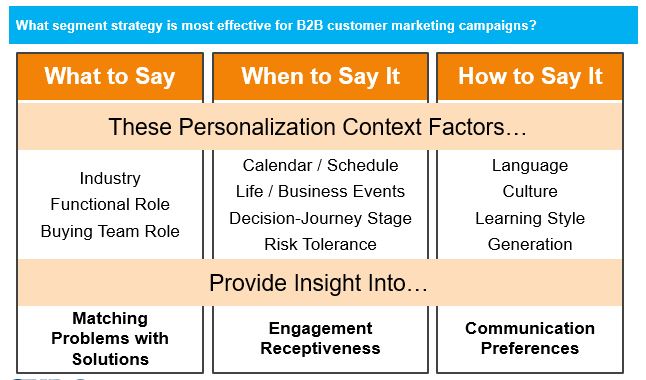To differentiate in the crowded B2B marketscape, marketers are leaning more heavily on content marketing techniques. In fact, content marketing is now the 3rd largest marketing spend, behind advertising and events. There’s a lot of content marketing noise for buyers to wade through, which is why so many marketing teams are looking for ways to make content more relevant for their audiences throughout their buyer journeys.
One key strategy that B2B marketers are exploring is personalization. Marketers increase buyer engagement and conversion by making content more relevant via personalization. Many factors can be used to personalize, including vertical industry, functional role, language, age, and other demographic factors.
Which personalization strategies work most effectively? Based on insights derived from several years of surveying buyers of information technology solutions, IDC finds that they can all be effective – if used to solve the right communication problem. Not every personalization tool is effective for meeting all personalization challenges.
Marketers must use several strategies simultaneously to truly personalize content and campaigns.

WHAT TO SAY:
Personalize by industry, functional role, and buying role to ensure the right value proposition gets to the right person on the buying team. These are the most commonly used B2B audience segmentation strategies. IDC finds that 91% of tech marketing companies segment communication by functional roles (e.g. technical buyers vs. line-of-business buyers) and 88% use vertical industry. These factors are very useful to match a buyer’s problem with the solution you provide. But they are not as useful for meeting other communication objectives.
WHEN TO SAY IT:
Improve receptiveness by sending the right message at the right time. Segmentation strategies such as industry and role provide almost no insight into determining when a buyer will be most interested in hearing a message. Business events matter – certain messages are most relevant when a contract is ending, for example. Buyers at different stages of their decision journey will be interested in different things – some messages make more sense during the early exploration stage than during the later purchase stage. Risk tolerance takes into account the biggest time-scale: the life-cycle of a solution category. You want to market new-to-the world solutions to innovative customers and wait until solutions are more mature before talking to conservative buyers.
HOW TO SAY IT:
To increase a buyer’s understanding of a message and improve their experience, match style elements such as the media channel, format, and language to what they are most comfortable with. IDC finds that there is very little difference in these kinds of preferences when buyers are segmented by industry, functional role, or even type of product purchase (e.g. cloud vs. on-premise software). However, IDC finds that communication style elements vary distinctly by generation. For example, Millennial senior decision-makers (born between 1981 and 1997) rank sales people as the least preferred conveyors of messages at all stages of the buyer’s journey (when compared to digital sources, peers and experts, and direct product experience), while Baby Boomer decision-makers (born between 1945 and 1964) prefer sales people above digital sources at each stage.
Buyer needs and preferences are rapidly evolving, and marketing organizations need to evolve with them. By gaining a better understanding of your target audiences, and by personalizing marketing messages and assets to those audiences, marketing professionals can critically improve a company’s revenue and customer retention efforts.
Learn more about the marketing planning, strategies, and technologies that can improve your outcomes. Contact us today.




